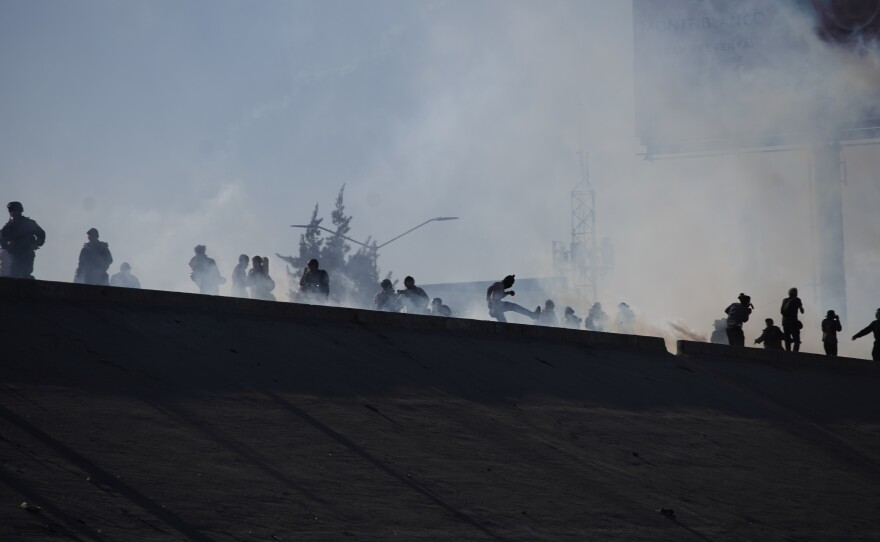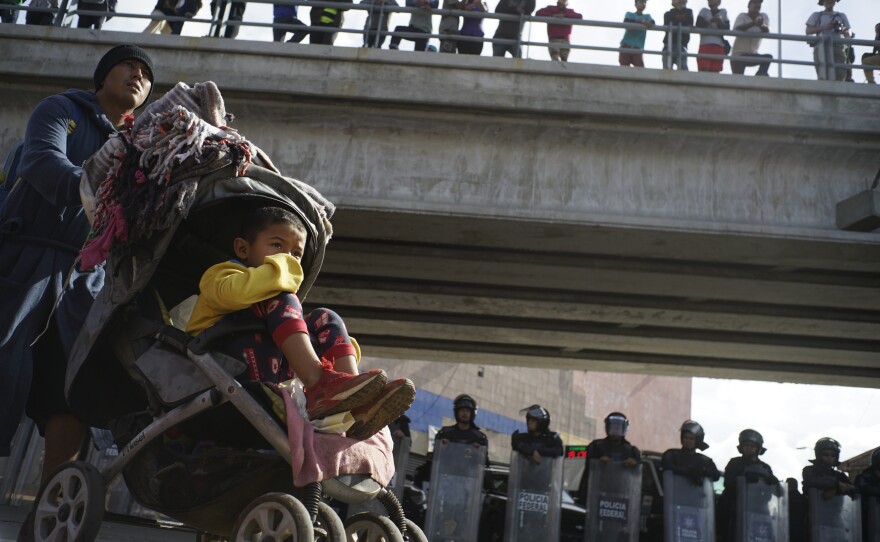Migrants approaching the U.S. border from Mexico have been enveloped with tear gas after a few tried to breach the fence separating the two countries.
U.S. agents shot the gas, according to an Associated Press reporter on the scene. Children were screaming and coughing in the mayhem.
On the U.S. side of the fence, shoppers streamed in and out of an outlet mall.
___
12:15 p.m., Sunday, Nov. 25, 2108
Central American migrants, mostly men, appear to be trying to breach the border crossing between Tijuana and California.
U.S. Border Patrol helicopters flew low overhead, while U.S. agents held vigil on foot beyond the wire fence. The Border Patrol office in San Diego said via Twitter that pedestrian crossings have been suspended at the San Ysidro port of entry at both the East and West facilities.
U.S. President Donald Trump took to Twitter again Sunday to express his displeasure with the caravans in Mexico.
"Would be very SMART if Mexico would stop the Caravans long before they get to our Southern Border, or if originating countries would not let them form (it is a way they get certain people out of their country and dump in U.S. No longer)," he wrote.
___
Saturday, Nov. 24, 2108, by Julie Watson / AP
The mayor of Tijuana has declared a humanitarian crisis in his border city and said Friday he was asking the United Nations for aid to deal with the approximately 5,000 Central American migrants, most of whom were camped out inside a sports complex.
The comments by Mayor Juan Manuel Gastelum came as city officials and volunteers worked together to assist the 4,976 men, women and children who had arrived after more than a month on the road. The Trump administration has spent weeks lambasting the caravan, which it said was filled with criminals, gang members and even — it insinuated at one point without any proof — terrorists.
Manuel Figueroa, who leads the city's social services department, said Tijuana was bringing in portable toilets and showers, as well as shampoo and soap.
It wasn't enough.
"Because of the absence, the apathy and the abandonment of the federal government, we are having to turn to international institutions like the U.N.," Figueroa said.
Rene Vazquez, 60, a Tijuana resident who was volunteering at the stadium, said Mexico's federal government ignored the problem by allowing the caravan to cross the country without stopping. Now the city of 1.6 million is stuck with the fallout.
"I don't have anything against the migrants, they were the most deceived, but this is affecting us all," Vazquez said.
Gastelum vowed not to commit the city's public resources to dealing with the situation. On Thursday, his government issued a statement saying that it was requesting help from the U.N.'s Office for the Coordination of Humanitarian Affairs.
Vazquez, who plays on a soccer team that uses the sports complex, said Mexico should step up now and process humanitarian visas for the group so they can start looking for work. Meanwhile, since his soccer team can no longer practice at the complex, he was spending time passing out donated pizzas and roasted chicken to the migrants.
The migrant caravan that left Honduras in mid-October was mostly well received by the towns it passed through along the way to the border. Even cities with few resources made sure the migrants had food and a place to rest.
But in those places, the caravan stayed at most two nights — with the exception of Mexico City. In Tijuana, many of the migrants who are fleeing violence and poverty are seeking asylum in the United States and face the prospect of spending months in the border city before they have the opportunity to speak with a U.S. official.
Gastelum said Friday that the Mexican government has talked about sending 20 tons of resources to Tijuana to help but that three-fourths consisted of materials to reinforce the border and only 5 tons were for the migrants.
The mayor also criticized the federal government for not taking more seriously President Donald Trump's threat Thursday to shut down the border if his administration determined Mexico had lost "control" of the situation in Tijuana.
"That's serious," he said.
The migrants also were receiving support from local churches, private citizens who have been providing food, as well as various agencies of the Baja California state government, which says it identified 7,000 job openings for those who qualify.
Adelaida Gonzalez, 37, of Guatemala City arrived in Tijuana three days ago and was having a hard time adjusting. She was tired of sleeping on a blanket on a dirt field, of waiting 30 minutes to go to the bathroom and again to get food and didn't know how much more she could take.
"We would not have risked coming if we had known it was going to be this hard," said Gonzales, who left Guatemala with her 15-year-old son and her neighbor.
She said she was considering accepting Mexico's offer to stay and work in Chiapas as a refugee.
Some of the migrants staged a small demonstration at the city's Chaparral border crossing Thursday, and a few dozen spent the night there. Police cordoned off the streets around the crossing tangling traffic, but pedestrian traffic across the border continued uninterrupted Friday.
Alicia Ramirez, 65, a Tijuana businesswoman, said she had been worried she wouldn't be able to make her annual Black Friday crossing to do her Christmas shopping, but had no trouble walking into California. About a dozen Mexican police stood by the crossing carrying plastic shields.
Still, the threat of a border closure kept her daughters in Los Angeles from coming to see her for the holidays.
"My daughters were worried, so they decided not to come," she said.
__
AP writer Christopher Sherman in Mexico City contributed to this report.










